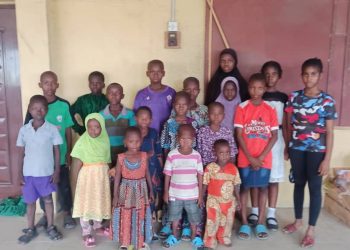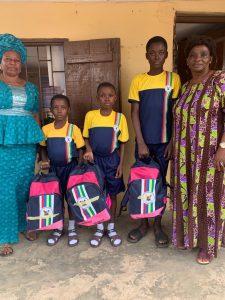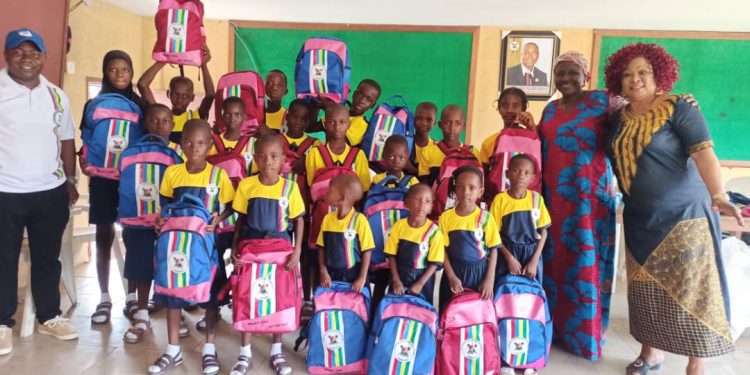Nigeria is one of the countries with the highest number of out-of-school children in the world; about 20 million children are said to be out-of-school, according to the latest global data by the United Nations Educational, Scientific and Cultural Organisation (UNESCO).
This figure represents a 5 million surge from the 15 million record in Nigeria, prior to the outbreak of the COVID-19 pandemic in 2020. The situation, apparently, confirmed the resultant effect of the disruption in the education activities in the country, as a result of the endemic.
Similarly, a survey conducted by Save the Children International after the reopening of schools for academic activities also indicated that many children were not returning to school due child labour, child marriage, and financial hardship, which had worsened with the pandemic.
UNESCO reported as well that the pandemic affected more than 1.5 billion students and youth in the world with the most vulnerable learners being the hardest hit, thereby impacting negatively on some of the gains already made towards the goals of the 2030 Education Agenda.
Lagos State, being the epicentre of the pandemic in Nigeria was not left out in the closure of schools, hence the state experienced a drastic decrease in the number of students that re-enrolled when the lockdown was eventually lifted and students resumption of schooling.
The Launch of Project Zero
To address the growing population of out-of-school children in Lagos State, the State Government through the Lagos State Universal Basic Education Board (LASUBEB) launched Project Zero in collaboration with members of the Organised Private Sector in the state.
The project, which was aimed at drastically reducing the out-of-school children in the state, was designed to track and bring the affected children or pupils who may be on the verge of discontinuing their education back to government schools.
The project, which was launched in 2020, the Chairman of LASUBEB, Hon. Wahab Alawiye-King, said it was targeted at the children, who dropped out of school due to the socioeconomic impacts of the COVID-19 pandemic. The Zero Project, she said, engaged critical stakeholders within the basic education space to accelerate support for the initiative.
According to him, the approach deployed by the project to track, identify and re-enroll students back into school is multi-faceted with the goal of ensuring no child is denied access to education.
“Specifically, pupils who did not return to school after the lockdown was eased, were identified through the class register and the teachers were assigned to visit them and verify why they did not resume school.
“Class teachers were made responsible to ensure those pupils return to the classrooms, and there are readily available new school uniforms, school bags, writing materials, socks, and sandals to be given to such students to help them return to school.
“Also deployed to ensure that the children return to schools were awareness at the Local Government levels, door-to-door approach, word of mouth, radio and television jingles among others,” Alawiye-King said.

Decreasing number of out-of-school children in Lagos
Basira Ali is one of the beneficiaries of phase II of the project. Ali, a ten-year-old girl, had never been to school prior to the intervention. Her mother was informed of the project during the door-to-door outreach, when she made the decision to enrol her daughter in the Amuwo-Odofin primary school after she learnt it cost no fee to do that.
“This is her first experience in school, and I am glad I made the decision. Before she was enrolled in school, she used to assist me to sell my wares in the community, but I believe the enrollment would secure a good future for her,” Mrs Ali said.
Another parent of a beneficiary, who simply identified herself as Maimunah shared a similar experience. Maimunah, whose daughter enrolled at a primary school in Oshodi Local Government Area of the state, said she could not imagine her son would be enrolled in school, as it was not a priority to her.
Maimunah, however, hoped that the support could continue such that all the educational needs of her son are adequately taken care of.
Recounting the gain of the intervention, Mrs. Adeyemi Omoyemi Omotunde, Social Mobilisation Officer at LASUBEB told BONews that Lagos State had over 500,000 out-of-school children prior to the launching of the project; over 17,000 of these children have returned to school, and provided with basic school kits as a result of the initiative.
“Lagos State had over 500,000 out-of-school children as of 2019 before we started the project. But as of now, over 17,000 children are in school and are provided with books, bags, uniforms, socks, shoes, and basic school kits. All they need to do is get ready for school,” she said.
Project Zero was implemented in three phases by LASUBEB; the first phase, which was during COVID-19 in November 2020. Phase II kicked off after COVID-19 lockdown while phase III was launched afterward to engage different stakeholders as the project expands.
For Phase II, which was launched in February 2022, Hon. Alawiye-King asserted it was all-encompassing rather than the first phase that focused on COVID-19 alone. This, he explained, was because the project had attracted support from stakeholders.
“What we have done is to identify some organisations that are working with us to go out there and identify those kids who are willing to go to school, but for one reason or the other cannot go. We also give them all those little supporting materials – school uniforms, school sandals, stockings, writing materials, to encourage them to come to school,” he said.
For phase III, which was launched in September 2022, Mrs. Omotunde said it included members of the School-Based Management Committees (SBMC); the committees that were responsible for identifying out-of-school children in their immediate communities.
Omotunde said “the last and present phase we are in now is being implemented by the SBMC members, who have passion for children and are always on the lookout for them. So let’s say, for instance, child A is qualified to be in school and his parents do not have the financial capabilities, it is the job of the committee to come to the closest Local Government Education Authority (LGEA) or SUBEB to report the situation.
After due consideration and consultations, the child will be enrolled in the nearest primary school in their locality or LGEA. Corroborating the claim, Toyin Bamgboye (not real name), a member of Civil Society Action Coalition on Education For All (CSACEFA), an independent group that is monitoring the implementation of the project, related that beneficiaries of the project are highly concentrated in Ikeja Local Government Area of the state and included children from all geo-political zones across the country, with many from Borno State in the North East.
Bamgboye noted that children with disabilities also enrolled under the scheme as well as few children from West African countries of Togo, Republic of Benin, Niger Republic and Ghana. Many of them, he said, enrolled at public schools in Surulere, Ifako-Ijaye, Amuwo-Odofin, and Ojo LGAs.
She asserted that “majority of the children that benefited from the initiative in Ikeja LGA were brought to Lagos to escape insurgents in their states. They have lost their families and had to come to Lagos with some people who stand as their guardians. These guardians used them for hawking and did not care about their education.
“However, with project zero, they have been enrolled in schools. And these were some of the things we found out during our monitoring exercise.”

Despite its impacts, Project Zero has various barriers
One of the challenges that affected the implementation of Project Zero was non-availability of updated data for LASUBEB to plan with.
Mrs. Omotunde said it was challenging getting “accurate data on the ever-growing population of the state”. Sometimes, he said the board had to go back to the drawing board because plans need to be tweaked and amended to suit the present realities.
Another major limitation of the initiative according to the LASUBEB official is the fact that it tackles out-of-school children at the basic education level only, whereas there are drop-outs in secondary schools as well.
Though LASUBEB focuses on basic education, the Lagos State Ministry of Education’s mandate covers the entire education sector including primary and secondary.
It is also perceived as discriminatory of people who never dropped out of school. Because the initiative is targeted at the out-of-school students only, those who never dropped out of school felt exempted as they did not receive the school kits.
This, Bamgboye regretted, spurred some students to deliberately withdraw from school, so that they could re-enroll and receive the handout.
In some instances, some pupils never returned to school, which means the initiative is also indirectly leading to the increase in out-of-school children, a problem it was designed to address.
It is found that some contractors, engaged to provide school kits, engaged in sharp practices. For instance, contractors were required to get kits for a specified number of students and return to SUBEB when the collection was exhausted.
Sources noted, however, that some of these contractors would collect kits or in some cases funds for the kits, but these would never reflect in the enrolment of students in the schools.
“This means that contractors are telling SUBEB that they have been able to return a specific number of children to school, when in reality, that is not the situation,” said a source, who pleaded anonymity.
This story has been made possible by Nigeria Health Watch with support from the Solutions Journalism Network, a nonprofit organization dedicated to rigorous and compelling reporting about responses to social problems.

